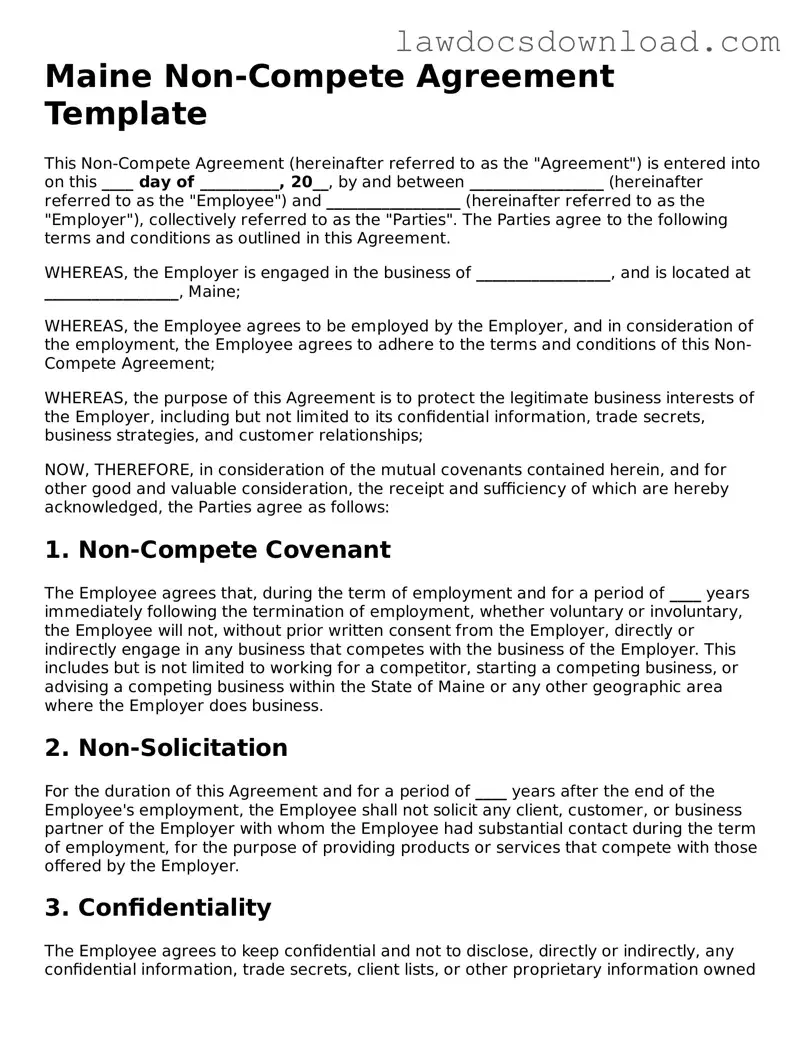Maine Non-Compete Agreement Template
This Non-Compete Agreement (hereinafter referred to as the "Agreement") is entered into on this ____ day of __________, 20__, by and between _________________ (hereinafter referred to as the "Employee") and _________________ (hereinafter referred to as the "Employer"), collectively referred to as the "Parties". The Parties agree to the following terms and conditions as outlined in this Agreement.
WHEREAS, the Employer is engaged in the business of _________________, and is located at _________________, Maine;
WHEREAS, the Employee agrees to be employed by the Employer, and in consideration of the employment, the Employee agrees to adhere to the terms and conditions of this Non-Compete Agreement;
WHEREAS, the purpose of this Agreement is to protect the legitimate business interests of the Employer, including but not limited to its confidential information, trade secrets, business strategies, and customer relationships;
NOW, THEREFORE, in consideration of the mutual covenants contained herein, and for other good and valuable consideration, the receipt and sufficiency of which are hereby acknowledged, the Parties agree as follows:
1. Non-Compete Covenant
The Employee agrees that, during the term of employment and for a period of ____ years immediately following the termination of employment, whether voluntary or involuntary, the Employee will not, without prior written consent from the Employer, directly or indirectly engage in any business that competes with the business of the Employer. This includes but is not limited to working for a competitor, starting a competing business, or advising a competing business within the State of Maine or any other geographic area where the Employer does business.
2. Non-Solicitation
For the duration of this Agreement and for a period of ____ years after the end of the Employee's employment, the Employee shall not solicit any client, customer, or business partner of the Employer with whom the Employee had substantial contact during the term of employment, for the purpose of providing products or services that compete with those offered by the Employer.
3. Confidentiality
The Employee agrees to keep confidential and not to disclose, directly or indirectly, any confidential information, trade secrets, client lists, or other proprietary information owned by the Employer, both during and after the term of employment, except with the prior written consent of the Employer or as may be required by law.
4. Return of Property
Upon termination of employment, for whatever reason, the Employee agrees to promptly return to the Employer all documents, materials, and property belonging to the Employer, including but not limited to keys, equipment, and electronic devices.
5. Remedies
In the event of a breach or threatened breach by the Employee of the provisions of this Agreement, the Employer shall be entitled to seek equitable relief, including but not limited to injunction and specific performance, in addition to all other remedies available to it at law or in equity.
6. Governing Law
This Agreement shall be governed by and construed in accordance with the laws of the State of Maine, without regard to its conflict of laws principles.
7. Entire Agreement
This Agreement constitutes the entire agreement between the Parties pertaining to the subject matter herein and supersedes all prior agreements, understandings, negotiations, and discussions, whether oral or written, of the Parties. Any modifications to this Agreement must be in writing and signed by both Parties.
8. Acknowledgment
IN WITNESS WHEREOF, the Parties have executed this Non-Compete Agreement as of the first date written above.
_______________________
Signature of Employee
Printed Name: _______________________
Date: _________________________
_______________________
Signature of Employer
Printed Name: _______________________
Date: _________________________

